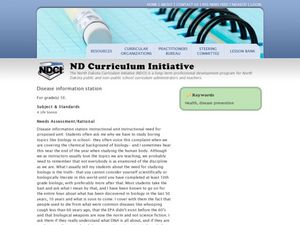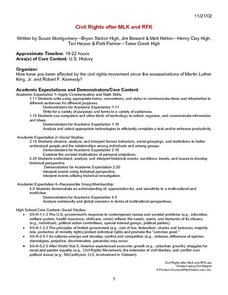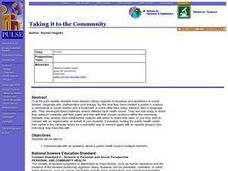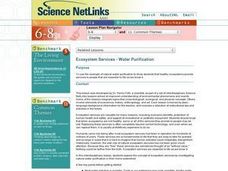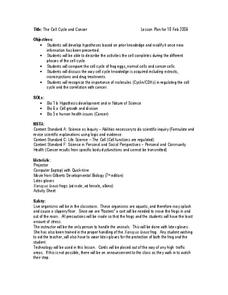Curated OER
The Food Pyramid
Fourth graders plan a variety of nutritional meals using the USDA's Food Guide Pyramid as a reference and analyze food labels to plan their meals. They examine and discuss the Food Pyramid, and create dichotomous keys separating food...
Curated OER
Using Words to Work Things Out
Students listen as teacher reads Words Are Not For Hurting, and answer questions about the content. Students discuss how to prevent arguments and work disagreements out with words. Students watch a puppet show that promotes discussion as...
Curated OER
Disease Information Station
Tenth graders study disease and how it changes normal body functions. In this research lesson students research a disease and use a word processing software to construct a presentation.
Curated OER
Laws Promoting Healthy Aging: A Comparison of Japan and the United States Lesson Plan
Students compare and contrast legislation passed in Japan and the United States in regards to the elderly. Using the Internet, they research how the government has put programs into place to improve the health of older citizens. They...
Curated OER
Civil Rights after MLK and RFK
Students are assigned to groups representing minority populations who produce a research project in a digital format from the list. A few of the choices are: speech, letter to the editor, editorial cartoon, etc.
Curated OER
"I Have a Dream" Shown in Pictures
Students demonstrate their understanding of Dr. King's dreams by drawing a picture representing one of them. In this Dr. King activity activity, students read the speech "I Have a Dream" and discuss the vocabulary. Students select one of...
Curated OER
Genetic Research and Liberties
Students examine civil liberties issues in relation to genetic research, and discuss how genetic medical information may be used. They present personal viewpoints about genetic research as it relates to civil liberties
Curated OER
Body Systems
Students view a video, they summarize the function or job of each body system. They are asked why is it important that athletes in training or a person who wants to tone muscles or stay healthy should comprehend how the systems could...
Curated OER
Introducting the Concept of Medical Ecology
Tenth graders examine the effects of the breakout of the West Nile Virus. They make predictions on its origin. They develop and present an action plan to stop the virus from spreading.
Curated OER
Toxicology 2: Finding the Toxic Dose
Young scholars brainstorm with group partners to decide upon a chemical they would like to test, and outline a procedure for their investigation. They then present in groups their ideas to the rest of the class as well as the chemical...
Curated OER
Presenting Ecology through Rodent Control
Students role play the member of a health department task force. In groups, they develop their own recommendations to control the rodent problem in the area. They email their local government official and research information about the...
Curated OER
The Role of the Government in Lead Poisoning Prevention
Students examine a general overview of the issues around lead poisoning in order to become more aware of the dangers and effects it has on the human body. They investigate how and why various government agencies and laws were...
Curated OER
Taking it to the Community
Learners communicate with an audience about a public health issue in multiple manners. They share their outreach materials with their peers and their chosen audience within the community.
Curated OER
Ecosytems: Water Purification
Students explore how ecosystems purify water and what kinds of things humans do that alter these processes. They use a website to access information on local watersheds and develop a "river" newspaper
Curated OER
The Allergy Chronicles
Students discuss their preconceived ideas about allergic reactions. They assume the role of health writers preparing a special section for the school newspaper on allergies. They research information about allergies and discuss their...
Curated OER
Indoor Air: What's the Matter?
Pupils develop a greater awareness of the variety and amount of particulate matter in the air. They try to locate general sources of pollution for a specific area and develop some suggestions for improving air quality.
Curated OER
Green Space in the City
Students examine city parks and their importance and affect they have on the health and well being of a community. An oral report with visual aids is prepared as a group to educate the class on the importance of green space in the city.
Curated OER
The Cell Cycle and Cancer
Young scholars compare and contrast the cell cycle of frog eggs, normal cells, and cancer cells. They watch a video about early development of the frog embryo, generate a hypothesis in small groups, and listen to a teacher-led lecture. ...
Curated OER
Women in Medicine: Past and Future
Students explore the scientific enterprise in relation to the role of women in science as it has developed over the last 150 years.
Curated OER
Anthrax Attacks
Learners develop an understanding about the disease Anthrax, how it is transmitted, and its effects on the body. By the end of the activity, students have gained the knowledge that bacterial diseases may invade and damage different body...
Curated OER
Women in Medicine: Past and Future
Students explore scientific enterprise in relation to the role of women in science as it has developed over the past 150 years. They compare the careers of two women, 100 years apart.
Curated OER
Xinjiang: A Bi-Cultural Perspective
Twelfth graders research the affects the Chinese Nuclear Program has had on the environment and the health of the Uighur minority.
Curated OER
Building a Healthy City (Final Project)
Students construct a scaled model of a city that provides for the economic and cultural needs of a community while maintaining high quality air and water to protect the public health. They articulate, in a presentation, the locations of...
Curated OER
Biological Sampling Device Using a Sea Perch
Students construct plankton nets to be towed and collect specimens to be examined and analyzed in the classroom. They develop research skills through collection of an aquatic sample. They write lab reports after interpreting, identifying...


